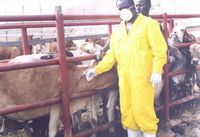NIMBioS Tuesday Seminar Series
In conjunction with the interdisciplinary activities of the National Institute for Mathematical and Biological Synthesis (NIMBioS), a seminar series will be hosted at NIMBioS every other Tuesday at 3:30 p.m. in the NIMBioS Lecture Hall on the 4th floor of 1534 White Ave., Suite 400 Seminar speakers will focus on their research initiatives at the interface of mathematics and many areas of the life sciences. Light refreshments will be served starting at 3 p.m.

Time/Date/Location: 3:30-4:30 p.m., Sept. 15, NIMBioS Lecture Hall, 1534 White Ave., Suite 400
Speaker: Carrie Manore, Oregon State University and Los Alamos National Laboratory
Topic:How Mathematical Models Can Help Control the Spread of Animal Diseases
Abstract:
Animal diseases, such as foot-and-mouth disease and avian flu, are
increasingly important in world economics, national security, and
biodiversity. Rinderpest is an important animal disease related to human
measles. It is a highly virulent and often lethal virus affecting
cloven-hoofed animals such as cattle, sheep, and pigs. Rinderpest
pandemics have caused wide-spread herd loss in Europe and Africa. If the
disease enters the United States, it could be devastating to animal
agriculture and the economy. To help prepare for this possibility, we
create a spatially explicit stochastic model for multi-host animal
diseases to better understand their spread in the United States. We
explore the effectiveness of mitigation strategies such as quarantine,
vaccination, and culling in a case study on rinderpest. Spread of
rinderpest is modeled using county-level data and animal transportation
rates to capture the within-county and between-county behavior. We
compare different mitigation strategies and analyze the sensitivity of
final epidemic size to these strategies in order to minimize loss due to
an outbreak of rinderpest. Generalizations of control strategies for
rinderpest are effective for other contagious animal diseases, such as
foot and mouth disease.
NIMBioS
1122 Volunteer Blvd., Suite 106
University of Tennessee
Knoxville,
TN 37996-3410
PH: (865) 974-9334
FAX: (865) 974-9461
Contact NIMBioS


